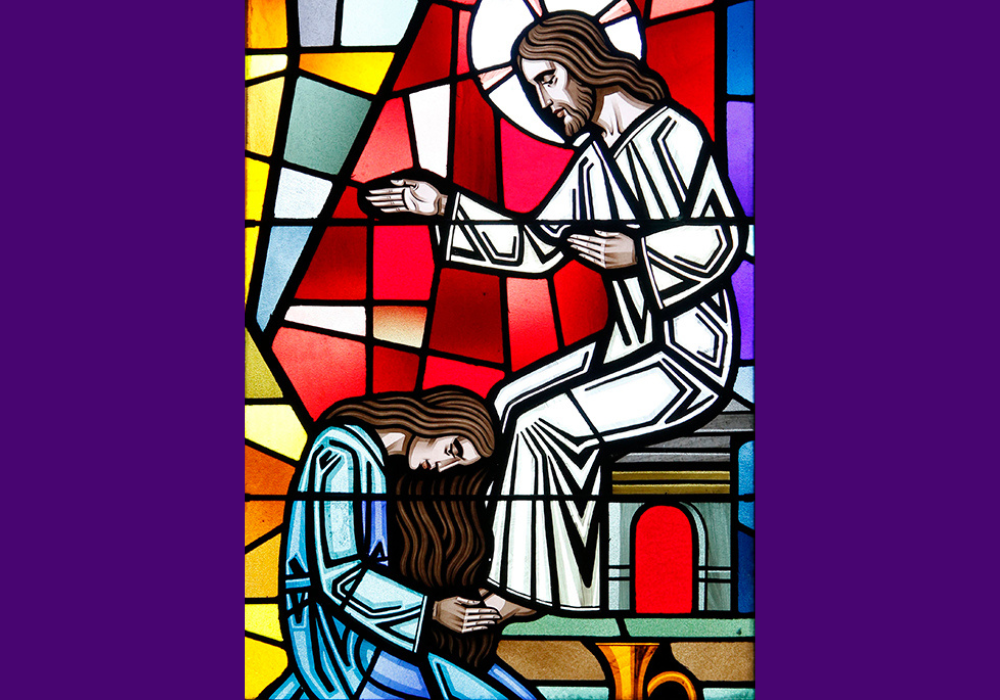
Mary Magdalene anointing the feet of Christ is depicted in a stained-glass window at St. Francis of Assisi Church in Greenlawn, New York. (OSV News/Gregory A. Shemitz)
Editors Note: As we draw near the conclusion of Easter, we remind our readers that Easter extends over 50 days, commencing from Easter Sunday and concluding with the celebration of Pentecost, marking the descent of the Holy Spirit upon the apostles, Mary, and those who followed Christ. This year, 2024, Easter began on March 31 and it will conclude on Pentecost Sunday, May 19. Following Pope Francis’s invitation, "Let us continue to journey together, like brothers and sisters to build harmony in the world."
Easter celebration is a time that fills my heart with indescribable joy. It is time to rejoice in Jesus' triumph of life over death. In my experience, belief in the resurrection of Christ gives us confidence in our Lord and deepens our Christian faith. This season is marked with memories of Christ's life on earth — his public ministry, suffering, death and resurrection. In Easter, we celebrate the assurance that death is not the end of life.
As I reflected on Easter, it dawned on me that the death of Christ would be in vain if we did not practice what he taught us by his exemplary living. Therefore, I chose to bring the lessons of Lent to Easter so that the resurrection of Christ could be more meaningful to me.
During Holy Week, Jesus performed actions towards the people who formed his company; and in return for the love received, they responded with love. This was a demonstration of how we should live with one another. This year I understood that Jesus is God with us in a deeper way than I have ever before. Two actions from Holy Week in the Scriptures have remained strongly with me, including the anointing of Jesus' feet by Mary of Magdala and Jesus washing the feet of his disciples at the Last Supper.
Something that happened recently reminded me strongly about Mary of Magdala's gesture towards Jesus. I was leaving a place that had been my home for the last 12 years. My community allowed me to invite some of my friends so that we could share a meal and I would get a chance to thank them and say my goodbyes. This invitation brought together people from different backgrounds. We had Mass and later lunch, which was a good experience for all in attendance. However, towards the end, I learned that there were gift presentations. I had not foreseen this part, and on learning of it, I wished the earth could open and swallow me. I did not expect it at all, and I felt somehow embarrassed, very uneasy. Similarly, I was conscious of one or two people in the crowd who would not approve of this. I was disturbed for a moment, and an inner voice told me: "Allow them to do what they want to do for you."
Advertisement
Thinking of this, I began to see how Jesus must have been humbled to accept kindness offered him by the people in his life. He did many good things for the people of his time; and when they wanted to express their love for him, he did not decline. I thought of many of us religious who are almost always giving yet find it very hard to receive from others, especially the poor. This realization made me delve even deeper, and I realized how the people in our lives are a means to discovering God's will for us.
The occasion reminded me of the words of Jeremiah 1:5: "Before I formed you in the womb I knew you, before you were born, I set you apart; I appointed you as a prophet to the nations." I looked at all the people who had come, and I recognized how I had interacted with each of them at different times and in different situations. Truly, in my encounters with them, each one had contributed to my understanding of God's will for me up to that moment. I understood that my stay with them was not a mere accident. It was part of God's purpose for my life. They had helped me to discover my strengths and limitations; they had offered me a ground where the God seed in me could take root and bear fruit.
In accepting their generosity even though I felt I did nothing to deserve it, I became aware of the need for me to be there for them to have a space where they too could give. Someone might say, "But they do not have anything to give." Material gifting is only one way of giving; over the years I have given less than I have received. Through the encounters I had with them, I learned great lessons of life that no manual could ever provide. This notion ties well with the gesture of the Last Supper when Jesus washed the feet of his disciples (John 13:1-17).
Easter is a great feast, and I recognize that as we celebrate the rising of Jesus from death and make considerations for one another by our lives, we give flesh to the lessons that he taught through his sermons and lived example.
After washing their feet, Jesus asked his disciples: "Do you understand what I have done for you? You call me 'Teacher' and 'Lord,' and rightly so, for that is what I am. Now that I, your Lord and Teacher, have washed your feet, you also should wash one another's feet." This is where the conflict lies between the religious and the people we serve. Jesus said we wash each other's feet and not just wash other people's feet. Many of us think that it is only religious people who are supposed to wash the feet of our brothers and sisters in the margins. Nevertheless, they too need a chance to wash others' feet, and that could be yours and mine.
I sense that the call this time is to create room for each one to wash others' feet. When it is my turn, then I need to "endure" and give others a chance to express their love. This may not be easy for many of us, however; the joy lies in seeing the delight in another person after being able to give. That there is someone to receive kindness no matter how small means so much. I reckon that Jesus was even happy to receive from the women who accompanied him on his journeys, not to mention the gesture of Mary of Magdala (John 12:1-8). Jesus defended Mary's action when Judas complained, an indication that he appreciated the gesture. Similarly, he must have been grateful for the people whom he served. Through touching their lives, he glorified the Father; otherwise, how would he have accomplished the mission for which he came? The poor listened to the good news, the prisoners received freedom, the blind were given sight and the year of God's favor was proclaimed.
All these deeds spoke to the followers as well as to nonbelievers. Therefore, when we live interdependently, giving and taking, God is glorified, hence manifesting the kind of community Jesus desired to establish and lived during his public ministry. Easter is a great feast, and I recognize that as we celebrate the rising of Jesus from death and make considerations for one another by our lives, we give flesh to the lessons that he taught through his sermons and lived example. This is one of the ways that Easter can make sense beyond the liturgical celebrations. It is a sign that we have understood what he did at the Last Supper.







